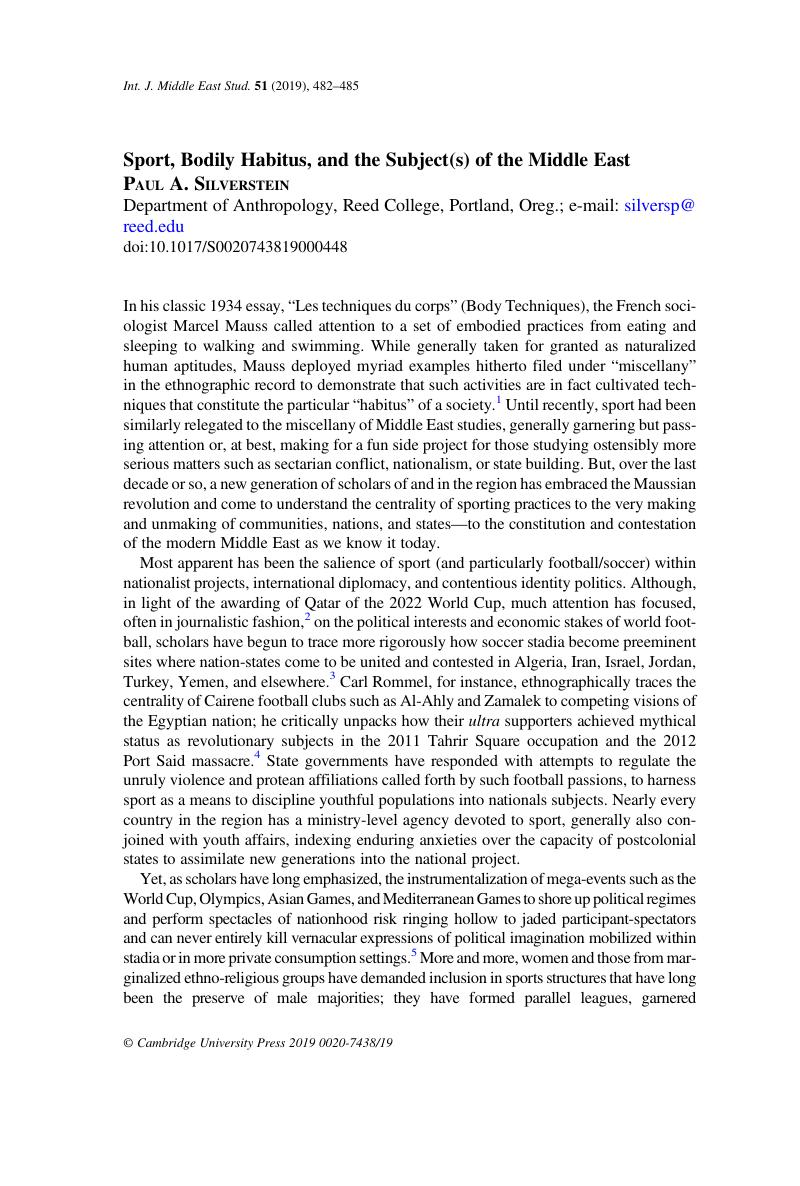Article contents
Sport, Bodily Habitus, and the Subject(s) of the Middle East
Published online by Cambridge University Press: 30 May 2019
Abstract

- Type
- Roundtable
- Information
- Copyright
- Copyright © Cambridge University Press 2019
References
NOTES
1 Mauss, Marcel, “Body Techniques,” in Sociology and Psychology: Essays (London: Routledge & Kegan Paul, 1979 [1934]), 95–123Google Scholar.
2 See Dorsey, James M., The Turbulent World of Middle East Soccer (London: Hurst, 2016)Google Scholar.
3 Amara, Mahfoud, “Football Sub-Culture and Youth Politics in Algeria,” Mediterranean Politics 17 (2012): 41–58CrossRefGoogle Scholar; Foozoni, Babak, “Religion, Politics, and Class: Conflict and Contestation in the Development of Football in Iran,” Soccer and Society 5 (2004): 356–70CrossRefGoogle Scholar; McManus, John, “Been There, Done That, Bought the T-Shirt: Beşiktaş Fans and the Commodification of Football in Turkey,” International Journal of Middle Eastern Studies 45 (2013): 3–24CrossRefGoogle Scholar; Silverstein, Paul A., “Stadium Politics: Sport, Islam, and Amazigh Consciousness in France and North Africa,” in With God on their Side: Sport in the Service of Religion, ed. Magdalinski, Tara and Chandler, Timothy (London: Routledge, 2002), 37–70Google Scholar; Sorek, Tamir, Arab Soccer in a Jewish State: The Integrative Enclave (Cambridge: Cambridge University Press, 2007)CrossRefGoogle Scholar; Stevenson, Thomas and Alaug, Abdul-Karim, “Football in Yemen: Rituals of Resistance, Integration, and Identity,” International Review for the Sociology of Sport 32 (1997): 251–65CrossRefGoogle Scholar; Tuastad, Dag, “The Political Role of Football for Palestinians in Jordan,” in Entering the Field: New Perspectives on World Football, ed. Armstrong, Gary and Giulianotti, Richard (Oxford: Berg, 1997)Google Scholar.
4 Rommel, Carl, “Troublesome Thugs or Respectable Rebels? Class, Martyrdom and Cairo's Revolutionary Ultras,” Middle East – Topics and Arguments 6 (2016): 33–42Google Scholar.
5 Andrea L. Stanton, “Syria and the Olympics: National Identity on an International Stage,” International Journal of the History of Sport 31: 290–305; Wedeen, Lisa, Ambiguities of Domination: Politics, Rhetoric, and Symbols in Contemporary Syria, 2nd ed. (Chicago: University of Chicago Press, 2015), 18–24CrossRefGoogle Scholar.
6 Ayub, Awista, Kabul Girls Soccer Club: A Dream, Eight Girls, and a Journey Home (New York: Hachette, 2009)CrossRefGoogle Scholar; Matuska, Nicole, “The Development of Women's Football in Morocco,” in “Sport in the Middle East,” special issue, Middle East Institute Viewpoints (2010): 35–37Google Scholar; Sehlikoglu, Sertaç, “Contestation and Dichotomies Concerning Women's Bodies and Sports in Turkey: From Aysun Özbek to Nslihan Darnel,” in Sport in Islam and Muslim Communities, ed. Testa, Alberto and Amara, Mahfoud (London: Taylor and Francis, 2015)Google Scholar.
7 Harkness, Geoff, Quinoz, Esther and Gomez, Kimberly, “Sports and Qatar's Empowered Woman Narrative,” Sociology Compass 12 (2018): e12631CrossRefGoogle Scholar.
8 Hargreaves, Jennifer, Heroines of Sport: The Politics of Difference and Identity (London: Routledge, 2001), 61–64Google Scholar; Tamir Sorek, “Hapoel Tel Aviv Fans and the Crisis of Liberalism,” in Sport, Politics and Society in the Middle East, ed. Tamir Sorek and Danyel Reiche (London: Hurst, forthcoming).
9 Jacob, Wilson Chacko, Working Out Egypt: Effendi Masculinity and Subject Formation in Colonial Modernity, 1870–1940 (Durham, N.C.: Duke University Press, 2012)Google Scholar; Yıldız, Murat, “‘What is a Beautiful Body?’: Late Ottoman ‘Sportsmen’ Photographs and New Notions of Male Corporeal Beauty,” Middle East Journal of Culture and Communication 8 (2015): 192–214CrossRefGoogle Scholar; Murat Yıldız, “Mapping the ‘Sports Awakening’: Toward a Regional History of Sports in the Middle East,” in Sport, Politics and Society in the Middle East.
10 Silverstein, Paul A., “The Pitfalls of Transnational Consciousness: Amazigh Activism as a Scalar Dilemma,” Journal of North African Studies 18 (2013): 768–78CrossRefGoogle Scholar. Masinissa (238–148 BCE) founded the Kingdom of Numidia in what is currently Algeria. His grandson Jugurtha (160–104 BCE) famously fought a protracted battle with Rome over his succession to the throne. Idir (Hamid Cheriet, b. 1949) is a Kabyle political folksinger whose 1976 ballad, “A Vava Inouva” (O Father, My Father), has become the de facto Amazigh national anthem.
11 Askren, Hana, “Tradition Trumps Sport: A Female Wrestler Retreats,” in “Sport in the Middle East,” special issue, Middle East Institute Viewpoints (2010): 31–34CrossRefGoogle Scholar; Fadil, Nadia, Ragazzi, Francesco, and de Koning, Martijn, Radicalization in Belgium and the Netherlands: Critical Perspectives on Violence and Security (London: I.B.Tauris, 2019)CrossRefGoogle Scholar; Silverstein, Paul A., “Sporting Faith: Islam, Soccer, and the French Nation-State,” Social Text 18 (2000): 25–53Google Scholar.
12 Benn, Tansin, Pfister, Gertrud, and Jawad, Haifaa, Muslim Women and Sport (London: Routledge, 2011)Google Scholar; Walseth, Kristin and Fasting, Kari, “Islam's View on Physical Activity and Sport: Egyptian Women Interpreting Islam,” International Review for the Sociology of Sport 38 (2003): 45–60Google Scholar.
13 Mahmood, Saba, Politics of Piety: The Islamic Revival and the Feminist Subject (Princeton, N.J.: Princeton University Press, 2005)CrossRefGoogle Scholar.
14 Farrer, D.S., Shadows of the Prophet: Martial Arts and Sufi Mysticism (New York: Springer, 2009)CrossRefGoogle Scholar.
15 Schielke, Samuli, “Being Good in Ramadan: Ambivalence, Fragmentation, and Moral Self in the Lives of Young Egyptians,” Journal of the Royal Anthropological Institute 15 (2009): S21–S40Google Scholar.
16 Tamir Sorek and Danyel Reiche, “Introduction: From Sports in the Middle East to Middle Eastern Sports,” in Sport, Politics and Society in the Middle East.
17 Mauss, “Body Techniques.”
- 1
- Cited by




